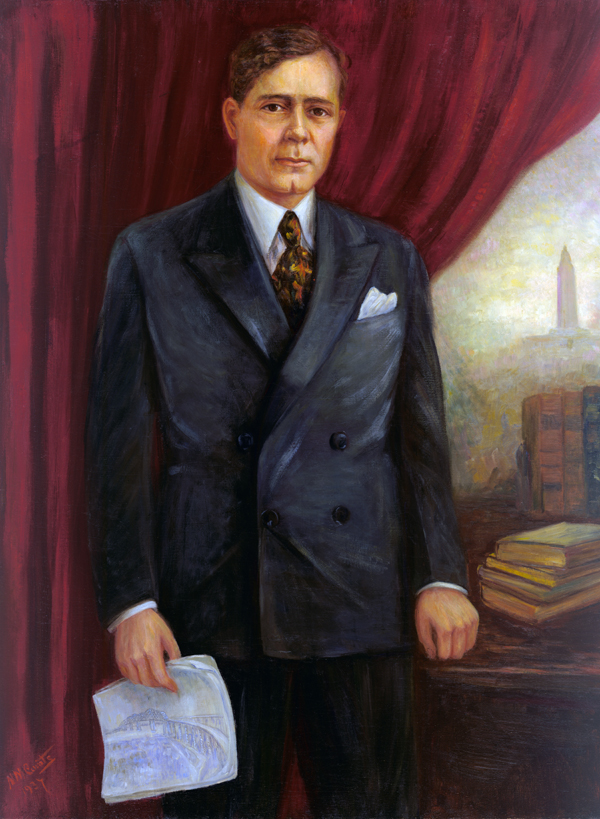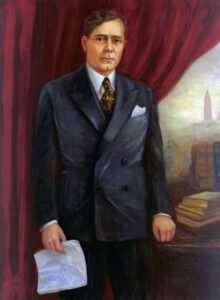Huey P. Long Jr.
Huey Long rose from ordinary beginnings in Winn Parish to become Louisiana’s most famous politician.
This entry is 8th Grade level View Full Entry

Louisiana State Museum
Official portrait of Governor Huey P. Long Jr. by Natale M. Comte.
Huey P. Long Jr. rose from ordinary beginnings in Winn Parish to become Louisiana’s most famous politician. Despite little formal education, Long became a lawyer at age twenty-one. With his legal defense of common folk, he earned a reputation for defending the disadvantaged.
In 1918 he began a political career that ultimately brought him into the governorship a decade later. Long built a powerful statewide political organization and embarked on a program loaded with public works, popular reforms, and heavy elements of corruption. In 1932 Long became a US senator and advocated strongly for the redistribution of wealth on the national scene. It is almost certain that he planned to run for president in 1936. Long’s political style made him many enemies. Ultimately this led to his death in 1935, when he was shot and killed in the halls of the Louisiana State Capitol.
What kind of reputation did Huey Long cultivate and how did his political career begin?
Long was born in the north-central Louisiana town of Winnfield on August 30, 1893. Winn Parish, in which Winnfield is located, had a reputation for political free thinking. A majority of its voters opposed Louisiana’s secession from the Union in 1861, and it was later a hotbed of the Populist Movement in the 1890s. Long attended public schools but never graduated. In 1910 he began a career as a traveling salesman in the Southwest, stopping briefly to attend the University of Oklahoma. In 1913 he married Rose McConnell. The couple had three children: Rose, Russell, and Palmer. Shortly thereafter Long spent a year at Tulane University School of Law before passing the bar exam to become an attorney. He then earned a solid reputation for his work on workers’ compensation cases and land and timber rights.
Long always intended to get into politics. In 1918 he ran successfully for the Louisiana Railroad Commission, and only four years later he became the commission’s chairperson. Continuing to champion the causes of the common folk, Long sought lower rates from utility companies and challenged corporate monopolies. In 1924 he ran unsuccessfully for governor on a platform that opposed the Standard Oil Company and traditional state politics. He ran a strong campaign as an “outside” candidate and used new methods like radio and sound trucks to reach voters. Still, his failure to take a clear position on the Ku Klux Klan issue hurt him with Catholics in the state. Then, heavy rains on election day kept many of his rural voters at home. He came in third. Four years later he ran again and was elected.
What were the successes and failures of Huey Long’s governorship?
In 1928 Long became governor. He used tremendous energy, a populist appeal, and criticism of the federal government’s inaction during the Mississippi River Flood of 1927 to win the election. Long’s campaign focused on economic populism. He attacked corporate power as well as the state’s established political and business interests. In the state capital, the “Kingfish,” a nickname that Long borrowed from the popular Amos ‘n’ Andy radio program, pursued a progressive program that featured improved education for people of all ages, inexpensive natural gas for New Orleans, and public construction projects. Long also systematically removed his political foes from power and built a new political machine with himself at its head. In 1929 he sought innovative new taxes on the products of monopolistic oil companies, an action that contributed directly to Long’s impeachment on various accusations from corruption to public profanity. The Kingfish, however, used his popularity with voters, brashness, and cunning legal scheming to evade the charges. The following year, Long created the weekly newspaper Louisiana Progress to sidestep the newspapers that generally favored his opponents and convey his ideas straight to voters.
Not all of Long’s plans, however, were successful. In 1930 state lawmakers defeated an impressive series of construction projects that Long favored. The Kingfish responded by campaigning successfully for the US Senate with the assurance that he wouldn’t leave the governorship until his term concluded. Long feared that his departure would allow the lieutenant governor, a fierce enemy, to gain political leverage in Louisiana. Long struck a temporary alliance with his one-time rivals in the “Old Regulars,” a powerful political group led by New Orleans Mayor T. Semmes Walmsley, that allowed his construction plans to move forward. Building plans for a new Louisiana State Capitol building and governor’s mansion, now known as the Old Louisiana Governor’s Mansion, were soon underway. Plans for road construction and increased spending on education, to be funded by a new gas tax, weren’t far behind. Special support went to Louisiana State University in Baton Rouge, Long’s favorite institution. In late 1931 Long used his influence to get his longtime friend from Winnfield, Oscar K. Allen, elected as Louisiana governor. With the state firmly under his control, Long resigned the governorship and left for Washington in January 1932.
How did Long influence national politics?
In the nation’s capital, Long declared himself a maverick. He resigned from all his committee assignments and attacked both major political parties for their failure to redistribute wealth and resolve the problems of the Great Depression. In 1932 Long vigorously backed the presidential candidacy of Franklin D. Roosevelt (FDR) and campaigned for him in the North. The Kingfish also campaigned for Hattie Caraway in Arkansas, using his widespread popularity and powerful speaking voice to help get the first woman elected to the US Senate.
In 1933 Long broke with FDR, contending that the president’s plans didn’t do enough to help the nation’s poor by redistributing wealth. Long began to criticize various New Deal programs, including the Glass-Steagall Banking Act and the National Recovery Administration. Some of this criticism stemmed from New Deal policies that protected big banks and other corporate interests, but Long also sought to distinguish himself from FDR, who he saw as a future rival for the presidency. He also aligned himself with the Senate’s more isolationist, liberal wing. FDR, believing Long to be a dangerous demagogue, began withholding federal money from Louisiana. The president also challenged the honesty of electoral results in Louisiana and instructed Internal Revenue Service agents to investigate the income sources of Long and his associates.
While Long continued his battle with FDR, he frequently visited Louisiana to preserve his influence at home. Through his personal power and by employing proxies, he secured an end to the poll tax and created a homestead property tax exemption. He also raised corporate taxes and expanded the size and authority of state government. His foes in both Louisiana and Washington increasingly contended that Long had the power and demeanor of a dictator. Comparisons with Hitler and Mussolini were common.
In 1934 Long began the Share Our Wealth Society (SOWS), a national group that sought to legally confiscate all annual incomes totaling more than $1 million and all personal fortunes topping $5 million. He intended to use the revenue generated to provide all American citizens with free education, homes, radios, and automobiles. His plan also included a guaranteed minimum income for all citizens, including African Americans, and a pension for the elderly. Under the guidance of the Reverend Gerald L. K. Smith, a skilled organizer and captivating orator, SOWS branches spread across the country. In 1935 Smith and Long boasted that the organization had more than 7 million members and twenty-seven thousand chapters throughout the United States. Many observers contended that SOWS forced FDR to move his administration toward the political left with the passage of the Social Security Act and the establishment of the Works Progress Administration.
What enduring effects did Long have on Louisiana?
While rumors persisted that Long would attempt to defeat FDR in the 1936 presidential election, the Kingfish continued to dominate politics in his home state. In September 1935 he went to Louisiana to supervise a special legislative session that would provide him with even greater control. On the night of September 8, 1935, Dr. Carl Austin Weiss entered a rear corridor of the new state capitol with the intent to confront or possibly even kill Long. Weiss, whose father-in-law was being pushed out of a judgeship as punishment for opposing Long, fired shots, but it is unclear whether the bullets that struck Long came from Weiss’s gun or from Long’s own bodyguards returning fire. Weiss was killed at the scene. Long died from his wounds two days later, on September 10, 1935.
Huey Long altered Louisiana politics forever. For three decades after his death, Louisianans debated the value of his achievements and voted accordingly. Through the 1960s, state politics were split between Longism and anti-Longism factions. Although Long attracted many supporters throughout the country with his brash economic proposals and brazen behavior, his achievements at the national level were few. Many contended that Long deserved to become president, but his death put that prospect, and Long’s seemingly endless ambition, to rest.
